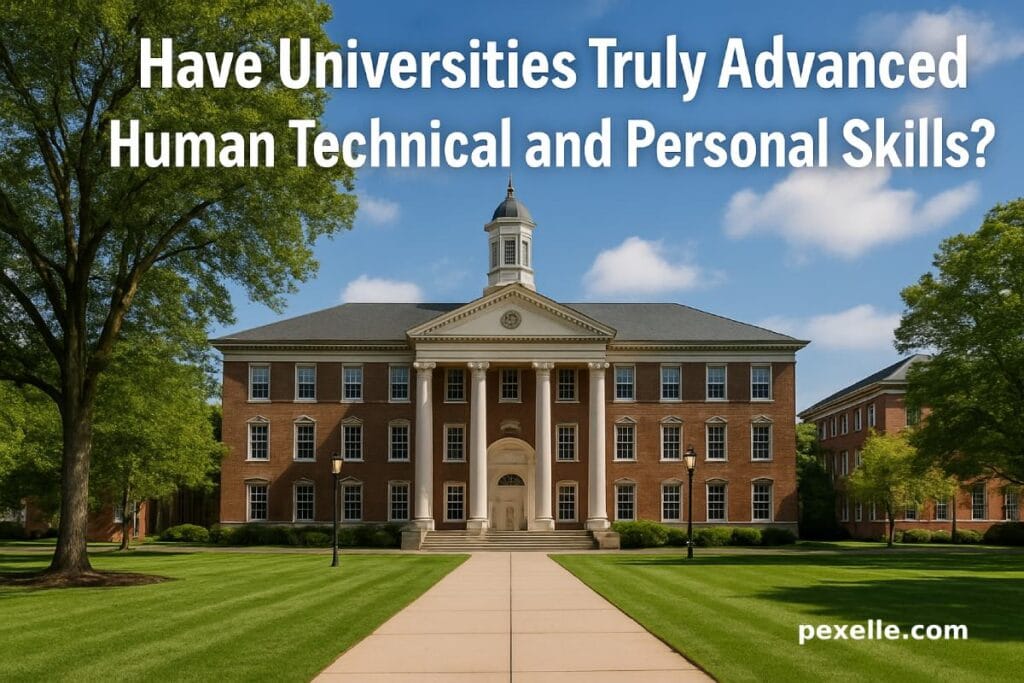Have Universities Truly Advanced Human Technical and Personal Skills?

Introduction
Universities have long been viewed as the central hubs for knowledge, innovation, and skill development. From producing top-tier engineers to shaping influential thinkers and leaders, the role of higher education in individual and societal development has been significant. However, in an era marked by rapid technological shifts and evolving job markets, a critical question arises: Are universities effectively equipping students with the technical and personal skills required in the real world?
✅ Achievements of Universities in Skill Development
Universities have contributed to major scientific and technological breakthroughs, nurturing generations of experts in fields such as medicine, engineering, and computer science. Through research, lab-based projects, capstone experiences, and group work, students often gain exposure to problem-solving, teamwork, and specialized technical know-how. Programs in liberal arts and social sciences have also fostered analytical thinking, communication, and ethical reasoning—crucial components of personal development.
Additionally, some institutions have adapted to modern needs by integrating entrepreneurship programs, coding bootcamps, innovation hubs, and career services to enhance students’ job readiness.
⚠️ Major Weaknesses in Developing Practical and Soft Skills
Despite these successes, there are clear shortcomings in the current university system that hinder comprehensive skill development:
- Outdated Curricula: Many programs rely on decades-old theories and textbook learning. In fields like software development or digital marketing, students often graduate with little knowledge of current tools, frameworks, or industry best practices.
- Limited Industry Integration: There’s often a disconnect between academia and the demands of real-world jobs. Internship opportunities, if offered, are often optional rather than integral to the learning process.
- Neglect of Soft Skills: While some programs emphasize academic rigor, they fail to teach vital interpersonal skills such as emotional intelligence, negotiation, leadership, or conflict resolution—skills crucial for personal and professional success.
- Mass Learning, Minimal Individual Focus: Large class sizes and rigid syllabi reduce one-on-one mentorship, making it harder to tailor learning paths that align with individual talents and passions.
🔄 Mismatch with the Skills Economy
A growing body of research indicates that employers increasingly value skills over degrees. Platforms like Coursera, Udemy, and LinkedIn Learning have filled the gap by offering fast, flexible, and often more practical upskilling paths. Meanwhile, graduates with traditional university degrees sometimes find themselves underprepared for job-specific challenges, resulting in frustration and underemployment.
Moreover, the rising cost of education has made the return on investment (ROI) questionable for many, particularly when the outcome is theoretical knowledge with limited application.
🛠️ What Needs to Change?
To reclaim relevance and empower learners, universities must evolve. This includes:
- Co-developing curricula with industry to ensure relevance.
- Embedding practical modules, like startup incubators, client-based projects, and real-time simulations.
- Prioritizing mentorship, life coaching, and personality development courses.
- Measuring outcomes not just by exams, but by skills demonstrated and applied in real-world settings.
Conclusion
While universities have been instrumental in fostering intellectual growth and innovation, they have not consistently succeeded in cultivating well-rounded, skill-ready individuals for the 21st-century workforce. The solution lies not in abandoning universities, but in transforming them—from institutions of knowledge transfer to engines of dynamic skill creation. 🎯
Source : Medium.com




